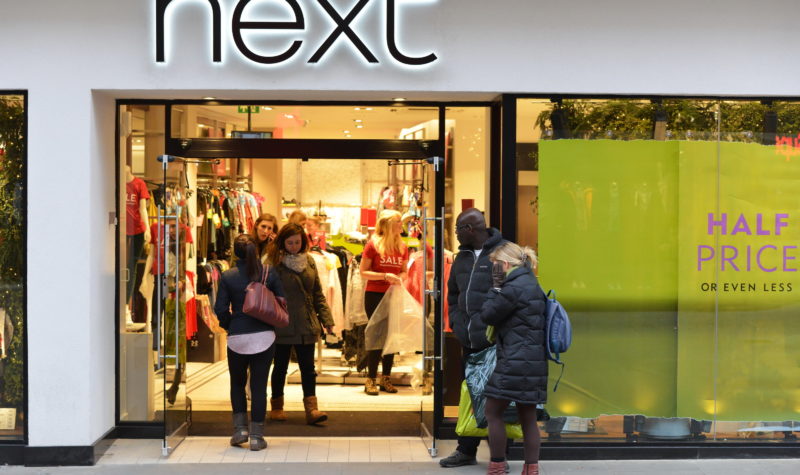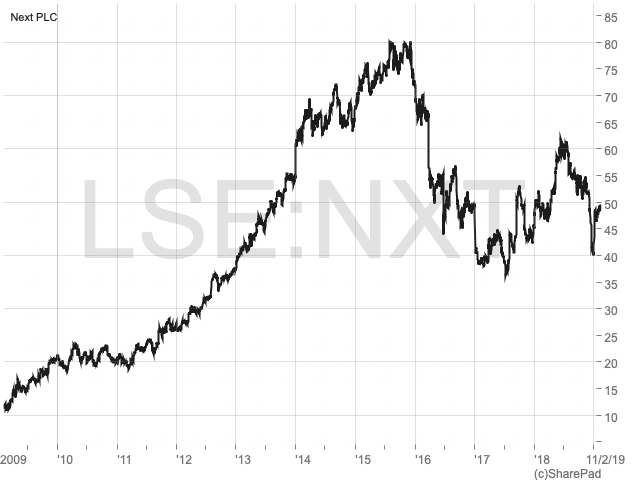Next: bucking the trend in retail

Buying shares in a UK-focused retail company may seem like a bad idea at the moment. The UK is, after all, experiencing a period of significant economic turbulence as the Brexit process continues. It seems to be causing consumer confidence to remain weak, which could be a recurring theme over the short term. This could put further pressure on retailers at a time when there are already significant threats facing the structure of the industry. Shoppers are increasingly favouring online opportunities over bricks-and-mortar stores, and this trend could lead to store closures and painful transitions for high street companies. With business rates also favouring online-only operators, the outlook for retailers with a physical presence in the UK seems to be tough.
As ever, though, higher risks could mean significant long-term rewards for those companies that are able to adapt to a changing retail industry. One company which seems to be able to do that is Next (LON:NXT). It has a track record of outperforming its industry peers during periods where operating conditions are tough. It aims to change various parts of its business model through investment, with it seeking to improve its online capabilities alongside the development of a more efficient supply chain. It is also becoming increasingly innovative in terms of its customer offering, and in developing its appeal to a growing leisure segment as consumer tastes continue to change.
With the company having a low valuation and yet offering medium-term growth prospects, it could have investment potential within what remains an uncertain wider retail industry.
Uncertain outlook for retail
| First seen in Master Investor Magazine
Never miss an issue of Master Investor Magazine – sign-up now for free! |
While wage growth is comfortably ahead of inflation, consumer confidence has steadily worsened in the last few months. According to the GfK consumer confidence index, it has declined from minus 7 in August 2018 to minus 14 in December 2018. This is its lowest level in five years, and shows that consumers are concerned about the prospects for the economy, as well as their own financial circumstances. This has resulted in a number of retailers reporting lacklustre sales and profit growth in recent months. Even though wage growth is comfortably ahead of inflation, consumers seem to be avoiding unnecessary expenditure where possible, and focusing on lower-priced options where they are available.
Weak consumer confidence could continue over the near term, with Brexit still to come. Additionally, the sector is facing structural changes which Next and its peers have found somewhat challenging to overcome. Improvements in technology have meant that online retailing is rapidly growing at the expense of bricks-and-mortar retailers. This trend is showing no sign of slowing, with the proportion of total UK retail sales conducted online rising to 22% in November 2018, from 6% in November 2008. There is expected to be further growth over the medium term, which means that bricks-and-mortar retailers will need to invest in order to adapt to changing consumer tastes.
High street retailers such as Next are also at a disadvantage compared to their online-only peers when it comes to business rates. They are charged against the value of a property. Since a high street store with high footfall will be worth more than a warehouse in an out-of-town location that is used to fulfil online orders, bricks-and-mortars stores are likely to have higher costs than their online-only rivals. This could mean that their margins are squeezed versus the wider sector, or that they are forced to pass on higher costs to consumers. This could damage sales growth and profitability over the medium term, since the government does not appear to be inclined to change the rules on business rates in the near future.
Changing business in a volatile sector
While operating conditions are expected to remain tough for the retail sector, Next has a track record of outperforming its peers.For example, following the financial crisis, it was able to deliver seven successive years of earnings per share growth through to 2016. This occurred during a period when consumer confidence was mostly weak, and consumer disposable incomes were declining in real terms for substantial periods of time. The company seems to have a high degree of customer loyalty. This could provide it with a competitive advantage versus peers that helps to offset possible weakness in the retail industry.
The company is also seeking to become increasingly innovative in order to adapt to changing consumer tastes. It has identified that the amount spent by consumers on clothing is growing at a slower pace than it is for leisure areas. For example, in 2017, consumer spending on women’s clothing fell by 2.9%, while spending on men’s clothing moved 4.1% higher. In contrast, spending at restaurants grew by 12%, and entertainment spending increased by 10.3%. In response, the company is seeking to introduce restaurants, cafes and other concessions to its stores that generate additional revenue and increased footfall.
Next is increasing investment in its online capabilities. In the 2018 financial year, it spent an additional £11 million on software and IT and marketing professionals. This has helped to improve its online offering – while a new mobile site, a faster checkout and other marginal gains have helped to boost the customer experience. The company’s omnichannel capabilities have been enhanced through features such as store-to-store ordering and transfers. This will maximise its store network and integrate its physical stores more closely with its online operation. The cost of transferring stock between stores is relatively low, and provides greater flexibility for consumers who are becoming increasingly demanding in terms of where, when and how they can shop at their favourite retailers.
As well as aiming to generate higher growth, Next is also seeking to reduce costs. This is not being done to the detriment of its product quality or customer service levels. Rather, it aims to operate more efficiently and smarter through changes such as right-sizing its delivery fleet in response to lower volumes, and using improved technology when replenishing products from its stock room. It also seeks to achieve improved lease terms on its physical stores. In the 2018 financial year, for instance, it renewed 19 leases in total, with the average reduction in rental costs being 28%.

From income stalwart to capital growth prospect
With the retail sector being relatively unpopular among investors, it is perhaps unsurprising that Next’s shares trade on a low price-earnings multiple. They have a P/E ratio of 11, which suggests that they offer a large margin of safety. The company, in spite of the risks facing the retail industry, is forecast to post a rise in earnings per share of 4% in the current financial year and in the next financial year. Given the uncertainty which is likely to be present during that time, it provides further evidence that Next is able to outperform many of its peers during challenging operating conditions. It also highlights the difference that the implementation of its strategy is expected to make.
The company’s dividend yield of 3.5% is around 100 basis points below the FTSE 100’s yield. While in previous years it has paid a special dividend, it now intends to use excess capital for share buybacks. As a result, its income opportunities may be somewhat limited compared to some of its index peers, with its appeal being focused on capital growth potential.
Potential rewards in a challenging sector
The prospects for retailers are likely to remain challenging over the short run. Consumer confidence may continue to be weak, with the Brexit process having the potential to cause uncertainty in future months. Alongside this, the retail sector is experiencing a period of significant change. Online shopping is becoming more popular, and this trend could even increase if technology continues to improve. Online-only operators may enjoy a competitive advantage from lower business rates, which could make the task of evolving a business model from physical stores to online operations more challenging.
| First seen in Master Investor Magazine
Never miss an issue of Master Investor Magazine – sign-up now for free! |
Next, though, seems to have a wider economic moat than many of its sector peers. The company has a strong track record of outperforming the wider sector during challenging periods. It is also making major changes to its business model as it seeks to adapt to evolving customer tastes. The investment it is making in its online capabilities and supply chain may boost its omnichannel offering, thereby increasing its customer appeal. Innovation and a shift towards the provision of leisure-related services could also enhance its financial prospects. Cost reduction may do likewise, with the company focused on maintaining high levels of customer service as it seeks to become more efficient.
Since the stock has a relatively low P/E ratio and earnings growth which is perhaps stronger than may be expected given the operating outlook, it could offer investment appeal. Clearly, there are significant risks facing the business in the short run which could lead to a declining share price for a period of time. In the long run, though, the strategy being pursued by the business and its track record of outperformance may catalyse its stock price. As a result, it may offer improving rewards within what could prove to be a challenging period for the wider sector.

Comments (0)